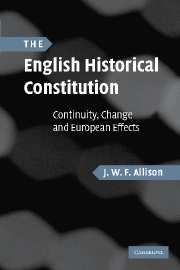Book contents
- Frontmatter
- Contents
- Table of Cases
- Preface
- 1 Introduction
- 2 A historical constitutional approach
- 3 The Crown: evolution through institutional change and conservation
- 4 The separation of powers as a customary practice
- 5 Parliamentary sovereignty and the European Community: the economy of the common law
- 6 The brief rule of a controlling common law
- 7 Dicey's progressive and reactionary rule of law
- 8 Beyond Dicey
- Conclusions and implications
- Bibliography
- Index
5 - Parliamentary sovereignty and the European Community: the economy of the common law
Published online by Cambridge University Press: 18 December 2009
- Frontmatter
- Contents
- Table of Cases
- Preface
- 1 Introduction
- 2 A historical constitutional approach
- 3 The Crown: evolution through institutional change and conservation
- 4 The separation of powers as a customary practice
- 5 Parliamentary sovereignty and the European Community: the economy of the common law
- 6 The brief rule of a controlling common law
- 7 Dicey's progressive and reactionary rule of law
- 8 Beyond Dicey
- Conclusions and implications
- Bibliography
- Index
Summary
The orthodox English legal view of parliamentary sovereignty has been insular in comparison with that of the separation of powers, the subject of the previous chapter, in which European interactions and English constitutional peculiarities have long been manifest. Dicey claimed that the ‘historical reason why Parliament has never succeeded in passing immutable laws … lies deep in the history of the English people and in the peculiar development of the English constitution’. Dicey's insular historical claim is quoted with approval by Jeffrey Goldsworthy in his influential and important work on the doctrine of parliamentary sovereignty. From a Commonwealth perspective on the English common law rather than its European context, Goldsworthy contributes to debates on the doctrine's current status by way of a historical study that understandably attaches little significance to European influences, ends with the start of the twentieth century and only touches, in passing, on the impact of Britain's joining of the European Community.
Dicey's view of the history of parliamentary sovereignty in particular and that of the English constitution in general is unacceptably insular. Prominent medieval examples of Continental European influence are evident in the provisions of Magna Carta and the work of Bracton. Goldsworthy begins his historical survey of the evolution of Parliament's sovereignty from that of the medieval English King by discussing Bracton's notion of kingship.
- Type
- Chapter
- Information
- The English Historical ConstitutionContinuity, Change and European Effects, pp. 103 - 127Publisher: Cambridge University PressPrint publication year: 2007



